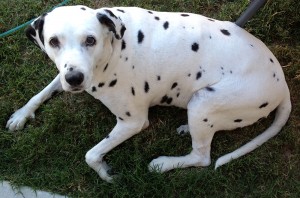 This hot and humid weather is definitely doesn’t agree with my dear Lilly. You see, Lilly has congestive heart failure so apart from her just not liking the hot weather she is finding it more difficult to breathe on the hot and humid days.
This hot and humid weather is definitely doesn’t agree with my dear Lilly. You see, Lilly has congestive heart failure so apart from her just not liking the hot weather she is finding it more difficult to breathe on the hot and humid days.
Congestive heart failure is when the heart is unable to function properly and efficiently pump adequate blood around the body. Diseases like mitral valve insufficiency or dilated cardiomyopathy are common causes of heart failure as well as heartworm, irregular heart rhythms or weakened heart muscles. Congestive heart failure and other heart disease can be either congenital, can develop due to other health issues or just happen due to old age. Some breeds of dogs are also more likely to develop heart failure like the giant dog breeds.
Lilly was diagnosed with heart failure about 12 months ago after I noticed some of the early warning signs and took her to the vet for a check up. The most common sign of heart failure is the intermittent cough. It is quite a deep sounding cough which usually occurs during exercise, excitement or exertion, it can also often be heard a couple of hours after the dog has gone to sleep. Other early signs include reduced activity, tiring easily and shortness of breath. As heart failure progresses the signs may include coughing more often and for longer, lack of appetite, weight loss, rapid breathing, fluid retention and abdominal swelling.
To diagnose a heart condition a vet will do a few tests. The vet will listen to the heart, chest and lungs for any abnormalities. A chest x-ray is usually done to determine if there is any heart enlargement and any presence of fluid in the lungs. Other tests that might be performed include an electrocardiogram (ECG), an echocardiogram (ultrasound) and blood or urine tests. Heart failure may be a secondary side effect to another health condition that a vet will also need to diagnose and treat. When Lilly was x-rayed her heart was enlarged and there was fluid on her lungs which confirmed that she was suffering from congestive heart failure.
Treatment for congestive heart failure usually involves prescription medication. There are a few different options of medication available and a vet will choose the one that will best suit your dog and their condition. It is important that the instructions given by the veterinarian are followed carefully and any concerns are discussed with the vet. Lilly is currently on Fortekor tablets and this seems to be managing her condition well as her last chest x-ray showed that the fluid on her lungs was gone and although her heart was still a bit enlarged there was some improvement. Your veterinarian may also recommend to start your dog on a low salt diet or a specific prescription diet, as the correct diet can also help manage the condition. Exercise is still an important part of a healthy lifestyle however it should be light exercise and undertaken in cooler weather. Exercise should be ceased if symptoms like shortness of breath, high heart rate or rapid breathing is seen and the dog should then rest and be monitored. For Lilly, she can manage a short (couple of hundred meters) stroll before she is exhausted and needs to rest. If left untreated heart failure can cause other health complications and put added strain on other organs like the lungs, liver and kidneys and it can result in death.
Dogs with congestive heart failure do require constant monitoring both at home and by a vet. They should receive a check up by their veterinarian at least every six months as their condition can change and sometimes medications need altering.
A dog suffering from congestive heart failure can live a very long and happy life it is being successfully treated, just like my Lilly.
If you think your dog may be suffering from heart failure or any medical condition please contact your veterinarian. If your dog is having difficulty breathing please take them to veterinarian as soon as possible as it can soon become life threatening.
Until next time,
Bec

